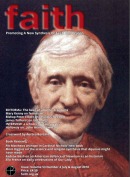
It is the basis of all other freedoms
Editorial:
01.07.18
In this issue we highlight a topic of grave importance: religious freedom.
Within living memory, this would not have been very much of an issue in Western countries. Britain, in particular, was conscious of a pride in offering true religious freedom, and of having fought a major world war in part to see that freedom upheld and sustained. It was not an absolute freedom. Resting on a recognition of a Christian heritage it assumed that this had created an understanding of the need for goodwill and tolerance, not least through the bitter experience of persecution of Christians by other Christians in earlier centuries. The message was “Freedom under the law” – street processions and the like could be subject to restrictions where they might lead to violence or confrontation that could disturb the peace. There was also a general sense that courtesy and common sense should restrain animosity.
Restrictions on religious freedom – and open persecution of Christians – belonged for much of the 20th century to the Communist empire of the USSR and is satellite states. The savage horror of the Gulag, the torture and imprisonment of Christian writers,
priests, teachers, and faithful believers – hallmarked the USSR from its earliest days. There were more Christian martyrs in the 20th century than in all previous centuries combined. This was Nero’s savagery on a huge scale.
We can thank God for Communism’s demise – and pause for a moment to ponder on the role that the heroic Christians of Eastern Europe played in that. And we can – and must – look at what is happening in Moslem countries and place the heroic Christians there at the heart of our prayers. We should also look at what is happening in the West, where there is no savage persecution but where we should note certain trends.
Today
We have no gulag in Britain or in other Western nations. We have become used to having opportunities for Christians to promote the Faith publicly and to use the vast opportunities of the mass media to do so. We are used to open debate and the free exchange of opinions. We are used to having churches in public places with notice-boards announcing Masses, events and services. We are used to the popularity of Catholic schools and to and a general recognition of Church events such as First Communion celebrations and parish fetes.
But something is changing. Today, as Bishop Peter Elliott notes in his special feature written from Australia, we are witnessing something new emerging. There is a real and sinister sense in which officialdom in the West is attacking the Church and the rights of Christian to voice and teach the Christian message, especially as it concerns love, marriage, and the transmission of life. We must face this with common sense, resilience and wisdom.
Truth and freedom
The Church is not asking for special privileges. As Pope St John Paul the Great put it “The Church proposes – she does not impose”.
The great Pope recognised that the Church needed to seek forgiveness for past actions on this, in order to face the future with clean hands. The Church had sometimes used coercion or violence, and at the start of a new millennium this needed to be addressed. “We forgive and we ask forgiveness. We are asking pardon for the divisions among Christians, for the use of violence that some have committed in the service of truth, and for attitudes of mistrust and hostility assumed towards followers of other religions.”
The issue here was about truth: the Church has been given the mandate to preach the truth about God and about humanity, about Christ as the Word made flesh, God tabernacled among us. This mandate comes from Christ and can never be abandoned. Nor are there any shortcuts – and attempts to use State power to coerce or bully people into formal acceptance of Church teachings will not fulfil the mandate or present an authentic face of Christ to the world.
At the solemn ceremony in St Peter’s, Cardinal Joseph Ratzinger, then Prefect of the Congregation for the Doctrine of the Faith, gave voice to this, lighting a candle signifying sorrow and a fresh start: “Even men of the church, in the name of faith and morals, have sometimes used methods not in keeping with the Gospel,”
Vulnerable?
Some commentators felt that the Church was making herself vulnerable by doing this. Surely the Church’s enemies would exploit these expressions of sorrow and use them for their own purposes? But as Fr Avery Dulles noted in a thoughtful commentary published at the time: “Our aim cannot be to appease the implacable foes of the Church, who will complain no matter what is done. But the fear that they will take advantage of our repentance should not deter us from doing what is morally required of us. While hostile critics will be dissatisfied, many persons of goodwill will be appreciative.” (Fordham University 1998). This proved rather prophetic.
Pope Benedict in Westminster
Cardinal Ratzinger, as Pope Benedict XVI, tackled a linked issue – the relationship between the Church and state power. Speaking in our own country, in the most famous Parliament building in the world, he emphasised that religion has a role to play in public life, as part of a wholesome discourse:
“Each generation, as it seeks to advance the common good, must ask anew: what are the requirements that governments may reasonably impose upon citizens, and how far do they extend? By appeal to what authority can moral dilemmas be resolved? These questions take us directly to the ethical foundations of civil discourse. If the moral principles underpinning the democratic process are themselves determined by nothing more solid than social consensus, then the fragility of the process becomes all too evident - herein lies the real challenge for democracy.”
Dialogue
He made no claim on the part of the Church for state imposition of Church teaching, but called instead for a fruitful dialogue in which all seek the common good, on a shared understanding that simply accepting a general consensus based on no principles is unsound.
“The central question at issue, then, is this: where is the ethical foundation for political choices to be found? The Catholic tradition maintains that the objective norms governing right action are accessible to reason, prescinding from the content of revelation. According to this understanding, the role of religion in political debate is not so much to supply these norms, as if they could not be known by non-believers – still less to propose concrete political solutions, which would lie altogether outside the competence of religion – but rather to help purify and shed light upon the application of reason to the discovery of objective moral principles.”
For decades, discussion about Catholic schools in Britain centred on demands for a fair share of the public funds available. Today this overlaps with debates about the actual content of religious education and about the freedom to offer children what the Church really teaches.We need a robust approach: Church-based schools are popular, sometimes embarrassingly so. People lie and fib in order to get their children into our schools. “Yes, Father, we are regular Mass-goers”. “Er...we’ve only just moved into the parish”. “Well, this is sort of our real address – we sort of live with my nan...” We must defend our schools with confidence and the knowledge that we are offering something that large numbers of people want. We must ensure that our Catholic schools teach Catholic doctrine, and uphold Catholic values – including the values that might clash with current trends in British society: marriage as the lifelong union of a man and a woman, the need for human life to be cherished from conception to natural death, the truth about our sexual identity as male or female.We must insist that Religious Education in Catholic schools is centred on the fullness of the Catholic Faith as expressed in the Catechism of the Catholic Church.As this first term of the School Year ends, our Catholic schools will be marking Advent and Christmas with carol services, Nativity plays, parties and celebrations. May they continue to be beacons of light in an often dark scene of moral and spiritual confusion in modern Britain.
Authentic
Pope Benedict excluded any call for a structured bond between Church and State, but presented the Church’s role in its authentic place, as the upholder of truths without which no society can flourish. Where the Church has used the power of the State to impose doctrinal orthodoxy, her own integrity has been compromised. She must speak not from a position of power but from one of freedom: with this in mind, he highlighted concern about the way in which Christianity is too often marginalised, even in countries priding themselves on their tradition of tolerance. Religion, he noted, in a useful phrase is “ not a problem for legislators to solve, but a vital contributor to the national conversation”. Dialogue between faith and reason should take place freely at every level of national life: “In this way, such basic rights as religious freedom, freedom of conscience and freedom of association are guaranteed”.
We are not asking for any favours, but for that freedom which a healthy society needs. To use that freedom properly and wisely, Christians need to be active: this is no time for retreating into an artificial sense of enclosure from the wider world. We have duties and responsibilities. William Wilberforce succeeded in abolishing the slave trade by tireless and dedicated Parliamentary work, rooted in his own sincere and prayerful Christian life and – as noted by Pope Benedict – provides a useful example of how a Christian can and should act in the public sphere.
Freedom
Pope Benedict XVI and his predecessor Pope St John Paul spoke about religious freedom with a particular wisdom gained through witnessing at first hand the Church experiencing persecution at the hands of State power, in Nazi Germany and in Communist Poland.
2018 marks the 50th anniversary of the election of Pope St John Paul in 1978. He was the first Pope since the early years of the Church to come from a country where the Church was oppressed: all the first 32 Popes were martyred and he almost joined their number. One of his first acts as Peter’s successor, at the start of what was to prove a long and fruitful pontificate, was to affirm the principle of religious freedom. In a letter to the Secretary General of the United Nations he stated: “religious freedom…is the basis of all other freedoms and is inseparably tied to them all by reason of that very dignity which is the human person.”

